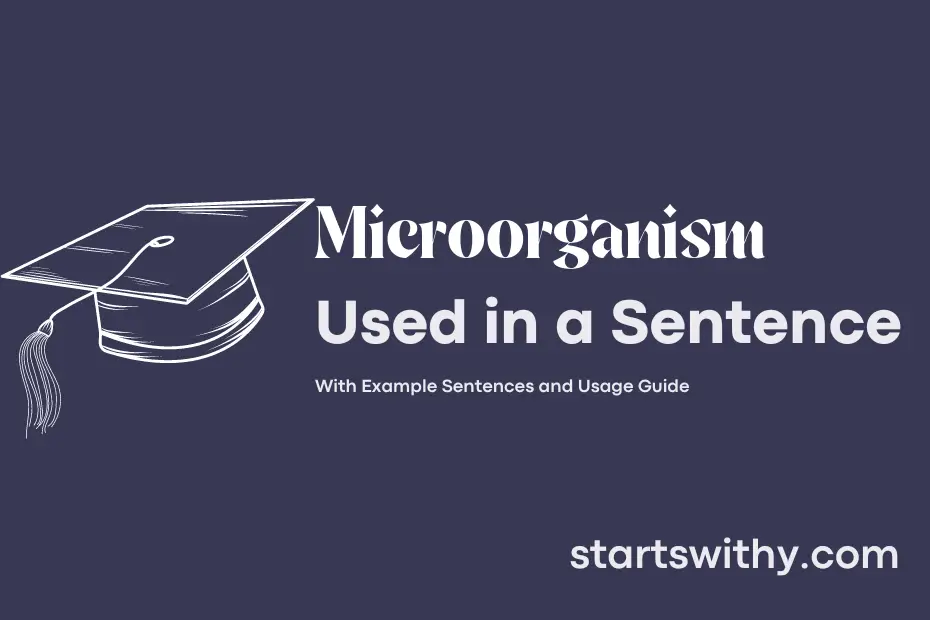Microorganisms, often referred to as microbes, are microscopic living organisms that play a crucial role in various ecosystems and biological processes. They can be found virtually everywhere, from the depths of the ocean to the soil beneath our feet, and even inside our own bodies.
These tiny organisms include bacteria, fungi, protists, and viruses, each with unique characteristics and functions. Despite their small size, microorganisms have a big impact on the environment, human health, and the food industry.
7 Examples Of Microorganism Used In a Sentence For Kids
- Microorganisms are tiny living things that we cannot see without a microscope.
- Some microorganisms help make curd or yogurt.
- Microorganisms like bacteria and viruses are everywhere around us.
- We must wash our hands to keep away harmful microorganisms.
- Microorganisms break down dead plants and animals.
- We can find microorganisms in soil, water, and even inside our bodies.
- Some microorganisms are used to make medicines and antibiotics.
14 Sentences with Microorganism Examples
- Microorganisms play a vital role in creating antibiotics that are used in the medical field.
- It is important for college students in India to have a good understanding of how microorganisms can impact our health.
- Understanding the benefits and risks associated with different types of microorganisms is crucial in the field of biotechnology.
- Research on how microorganisms can clean up oil spills is a fascinating topic for college students studying environmental science.
- As future healthcare professionals, college students need to understand how microorganisms can cause infections and diseases.
- College students studying food science should be aware of how certain microorganisms can spoil food.
- It is fascinating to learn about the ways in which microorganisms can be used in the production of fermented foods.
- Microorganisms play a key role in the process of decomposition, which is essential for nutrient cycling in ecosystems.
- College students interested in agriculture should study the interactions between plants and microorganisms in the soil.
- Exploring the diverse world of microorganisms through a microscope is an exciting aspect of studying microbiology.
- The study of how microorganisms can be used to improve soil fertility is important for sustainable agriculture practices.
- College students conducting experiments in a biology lab need to handle microorganisms with care to prevent contamination.
- Understanding the role of microorganisms in the human gut microbiome is a cutting-edge area of research.
- Researching the potential uses of microorganisms in bioremediation is a fascinating field for college students studying environmental engineering.
How To Use Microorganism in Sentences?
Microorganism refers to tiny living organisms that are often invisible to the naked eye. When using the word microorganism in a sentence, here are some tips for beginners:
-
Identify the subject: Start by identifying the microorganism you want to talk about. This could be a bacteria, virus, fungi, or protozoa.
-
Be specific: Provide specific details about the microorganism you are referring to. For example, instead of saying “I found a microorganism,” say “I observed a microorganism under the microscope.”
-
Provide context: Help the reader understand the role or significance of the microorganism in your sentence. For example, “The soil sample contained a diverse population of microorganisms that help break down organic matter.”
-
Use correct grammar: Make sure to use proper grammar and punctuation when including microorganism in your sentence. For example, “The presence of harmful microorganisms in the water supply raised concerns about public health.”
-
Avoid repetition: When using microorganism multiple times in a sentence, consider using synonyms or rephrasing to avoid repetition. For example, instead of saying “The microorganism was small,” you could say “The tiny microorganism was barely visible.”
By following these tips, you can effectively incorporate the word microorganism in your sentences and enhance your communication about these fascinating tiny organisms.
Conclusion
In conclusion, microorganisms play a crucial role in various aspects of life, from supporting our immune systems to aiding in environmental processes. These tiny living organisms, such as bacteria, viruses, fungi, and protists, can have both beneficial and harmful effects. Some sentences with microorganisms include “Microorganisms are essential for breaking down organic matter in soil,” “Certain microorganisms can cause infections in humans,” and “Probiotics contain live microorganisms that are beneficial for gut health.” Understanding the role and impact of microorganisms is important for maintaining human health, agriculture, and ecosystem balance. By studying and harnessing the power of microorganisms, we can continue to unlock their potential for improving our lives and the world around us.



